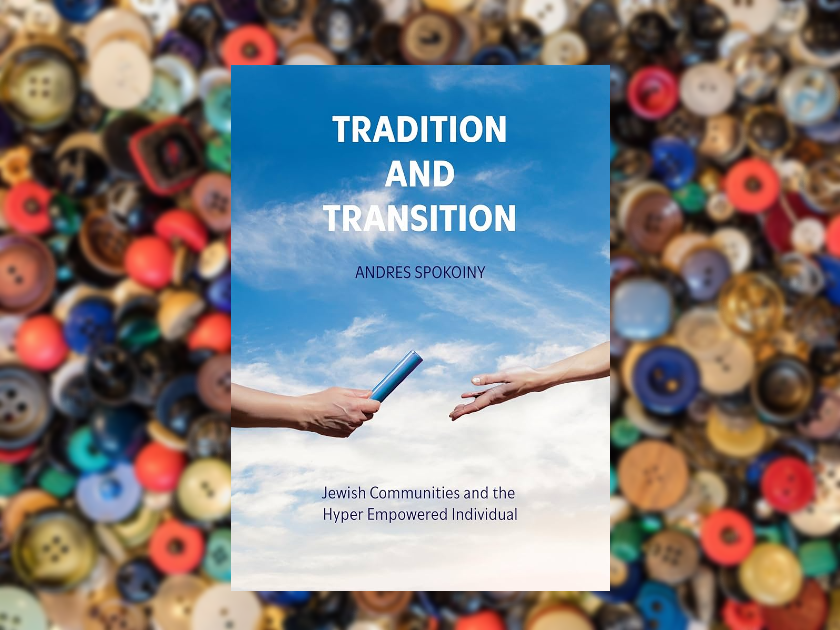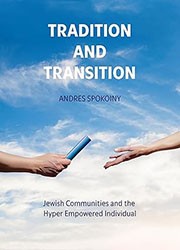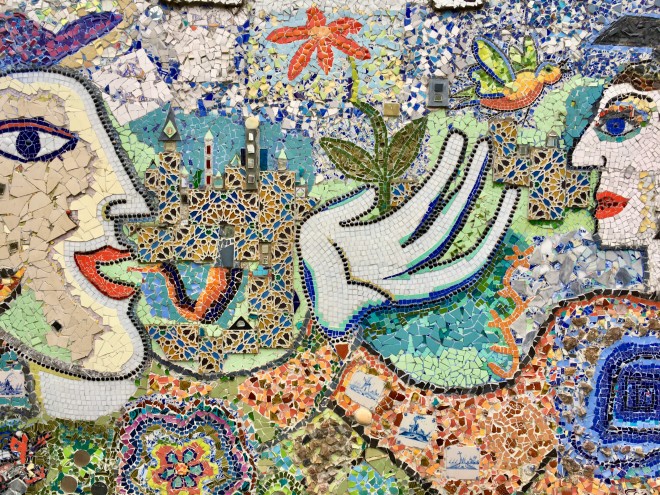
Dietmar Rabich, “Knöpfe — 2018 — 0502,” CC BY-SA 4.0, via Wikimedia Commons
The motivation for writing a book often falls somewhere between arrogance and generosity. And it’s funny how these two impulses interact. For example, the arrogant part of me thinks that I’m so well-intentioned that I wrote a book only as a selfless exercise in generosity.
Compulsion can also be a powerful source of motivation for writers. Like a person who’s seen a Rorschach test and can’t unsee a particular image, and then is driven mad by the failure of others to see the same one, writers sometimes feel they must bring others to see the world as they do.
My Rorschach image is the Jewish community, and I’ve been looking at that picture for many years. Amid the inkblots and ghostly figures, I see that Jewish communities in the Diaspora are confronting three simultaneous crises: a crisis of meaning, a crisis of belonging, and a crisis of organizational structures. This is not a groundbreaking discovery; many scholars have noted the same. What I am compelled to get the community to see, hidden deep in the crevices of the images we see every day, is that these crises are all linked to a profound transformation of the human condition — one that was unleashed three hundred years ago by the forces of modernity, and that has reached its apogee in our times.
Since the advent of modernity, individual freedom and choice have been expanding in concentric circles, like the stone-induced ripples on the surface of a quiet lake. The human being of today has more freedom and power than ever before in history. Before the eighteenth century, freedom of choice was extremely limited, almost nonexistent. In the late nineteenth and early twentieth century, the universe of choice expanded radically. People could choose things that in past centuries were mandated by social structures, like religion, occupation, community, place of residence, and spouse. In the twenty-first century, that freedom of choice has been taken to the extreme. If in the past we didn’t have freedom of choice, we now don’t have freedom from choice. In the nineteenth and twentieth centuries, individuals chose identities, belongings, and allegiances that came prepackaged. In the Jewish context, you could be Orthodox, Reform, Zionist, Communist, and so on. In the twenty-first century, however, we don’t only choose between identities, but we are forced to build our own, sometimes from scratch. Even those who “choose not to choose” are, paradoxically, choosing.
If in the past we didn’t have freedom of choice, we now don’t have freedom from choice.
This is what generates the mixture of unprecedented empowerment and anxiety with which we all live. Empowerment because we have the freedom and the technological means to decide who we want to be; anxiety because in a world of endless choice, it’s impossible not to second-guess your decisions and obsess over the roads not taken. Because we need to build our own selves, we need to devote enormous energy to “self-discovery.” And because we need our choices to be validated, we transform self-expression into a central social value.
Our community has been feeling the symptoms of these changes, the three crises outlined above. But my point — the form in the Rorschach that I desperately want you to see — is that without understanding this “New Human,” we won’t be able to redesign our community system in a way that is relevant to our times.
In North America, we have a community that was, by and large, designed between 1890 and 1920. And it has served us well. But that community — in all its dimensions, from the ideological to the structural — was a response to the challenges and historical circumstances of the early twentieth century, not to those that we face today.
So it falls on us to do what Jews have done so many times in our history: to dance the magic dance of change and preservation, continuity and rupture, tradition and transition.
In my book, published in June 2024, I offer a few guidelines on how to address those three crises. More than a list of actionable ideas, though, the book is an invitation to think anew. I’m convinced that we have the intellectual (and financial) wherewithal to create and sustain new ideologies, new communal structures, and new, meaningful forms of belonging.
I decided to write Tradition and Transition out of generosity, arrogance, and compulsion, but in actually writing it, I experienced a process of discovery. I got to know fascinating authors who predicted our times with great accuracy. For example, one of the seminal works I used in my research is Peter Berger’s The Heretical Imperative. Written decades ago, the book is a play on the etymology of the word “heretic,” from the Greek herateikon, “the one who chooses.” Berger foresaw that in the late twentieth century and beyond, we would all be heretics in the sense that we’d be forced to choose our own paths rather than follow dogma. Another work that opened my eyes to the darker sides of free choice is La fatigue d’être soi (The Weariness of Self) by French psychiatrist Alain Ehrenberg. Ehrenberg showed that throughout human history, people have experienced sadness and melancholy, but the combination of anxiety and depression that we see in the twenty-first century is uniquely modern; it’s the result of the exhausting (and doubt-generating) process of building one’s own self.
In my research, I also rediscovered the authors of the Romantic Period and saw them in a completely new light. Andrea Wulf’s 2023 book, Magnificent Rebels: The First Romantics and the Invention of the Self, demonstrates how much our understanding of the human condition was born in the salons of Iena amid the turmoil of the Napoleonic Wars. And last but not least, I realized that the writings of Canadian philosopher Charles Taylor (especially The Ethics of Authenticity) should be obligatory reading for those in positions of communal leadership.
Given that I am a communal leader myself, the challenges I outline in the book fill me with dread, but also with an intoxicating sense of opportunity. I feel excited about the need to build new ways of being Jewish, but also overwhelmed by the nature of the task. Empowerment and despondency — how 2024 of me!
Andrés Spokoiny is a longtime Jewish communal leader with a history of leading successful organizational transformations. He is the president and CEO of the Jewish Funders Network (JFN), the premier philanthropic organization of the Jewish world. Before that, Andrés served as the CEO of Federation CJA in Montreal and, prior to that, he worked for the American Jewish Joint Distribution Community (JDC) in Paris, France. Before his Jewish communal work, Andres worked for IBM Corp. and was responsible for training, development, hiring, and recruitment for IBM’s Latin America Southern Region. Andres has a multidisciplinary academic background, including business, education, and rabbinical studies in different institutions around the world. He was born in Argentina and lives in Brooklyn, NY.



